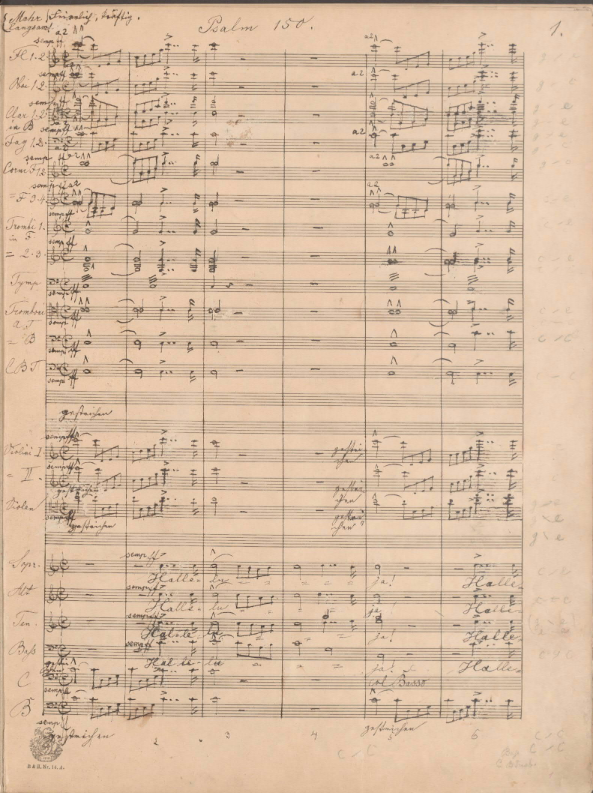
Anton Bruckner,
born 4 September 1824 in Ansfelden, Upper Austria
died 11 October 1896 in Vienna
Premiere:
13 November 1892 in Vienna, conducted by Wilhelm Gericke
CD recordings:
1950 Hilde Ceska, Vienna Academy Chamber Choir, Vienna Symphony Orchestra, conducted by Henry Swoboda
1965 Maria Stader, Chorus of the Deutsche Oper Berlin, Berlin Philharmonic Orchestra, conducted by Eugen Jochum
1992 Juliet Booth, Corydon Singers & Orchestra, conducted by Matthew Best
1996 Pamela Coburn, Gächinger Kantorei Stuttgart, Bach-Collegium Stuttgart, conducted by Helmuth Rilling
among others
The festive hymn Psalm 150 is one of Bruckner's last works and was commissioned for the International Exhibition of Music and Theatre in the summer of 1892 in Vienna's Prater Park. The fact that Bruckner received this commission shows that, since the success of his Seventh Symphony, he had arrived on the international music scene as a composer. Bruckner had the choice between Psalms 98 and 150. Bruckner chose Psalm 150 ‘because of its special solemnity’, using Martin Luther's translation as specified.
However, as soon as he accepted the commission, Bruckner realised that his age would prevent him from meeting the deadline. The premiere did not take place until November 1892.
Even the Viennese music critic Eduard Hanslick, who had always been very critical of Bruckner, praised the beginning of Psalm 150 as excellent: ‘Bruckner's muse is ecstasy... The psalm text, however, tempts him to deploy a tremendous amount of power and sonority.’ And at the end of the newspaper article, Hanslick's judgement becomes increasingly critical of Bruckner: “Bruckner’s new composition is not without external effect, but in terms of its artistic content it cannot be compared to his Te Deum” (Neue freie Presse, 17 November 1892, reprinted in Felix Diergarten: Anton Bruckner: Das geistliche Werke, Salzburg/Vienna 2023).
Bruckner himself called his Psalm 150 the “very best festive cantata” and also compared it to his Te Deum: “The psalm is written in roughly the same spirit as the Te Deum, but is shorter.” In his late work, Bruckner succeeds in blending symphonic style and vocal music. Some even refer to it as a symphonic poem.
As the conclusion to the biblical Book of Psalms, Psalm 150 has repeatedly appealed to musicians, because it attributes to music the function of praising God, something that poetry and rituals find more difficult to express. In Bruckner's psalm, too, one can discover different dimensions of God. It is not only the ecstasy-inducing abundance and power of God. The transcendent mystery as a further dimension of God inspires reverential awe, and the unimaginably great and creative nature of God, indeed everything ‘that gives breath’, inspires Bruckner to the highest human creativity. In his work, Bruckner succeeds in fusing a new symphonic style with traditional vocal art.
Listen here! (approx. 8 ½ min.)